History of CISPES
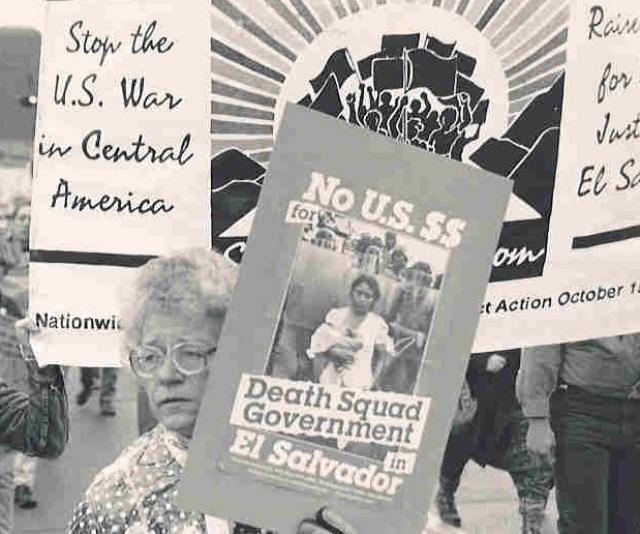
Founded by conventions in Los Angeles and Washington, DC in October of 1980, CISPES grew into a powerful national grassroots solidarity organization. In the 1980’s, we helped prevent a full-scale US invasion of Central America. In the 1990’s, we rejoiced with the Salvadoran people as they celebrated the end of the armed conflict and tentatively made the transition to new battlefields of struggle. In the 2000s, we joined Salvadoran labor unions and the broader social movement in their struggles against privatization and free trade policies like the US-Central America Free Trade Agreement (CAFTA). Together, we’ve celebrated historic presidential victories of the Farabundo Martí National Liberation Front (FMLN) in 2009 and 2014, which have opened new political space for building a just economic alternative to corporate globalization. We continue to build international support for the inspiring transformation underway in El Salvador today and to mobilize grassroots opposition to on-going US political, economic and military intervention.
El Salvador is Spanish for Vietnam
El Salvador first made international headlines with the assassination of Archbishop Oscar Romero on March 24, 1980. With growing impunity, the US-backed government resorted to massacres and death squad attacks aimed at a surging popular movement attached to a small, but growing, nucleus of armed revolutionary forces.
In 1981, Ronald Reagan rode into office determined to “draw a line in the sand” against the tide of socialist revolution in Central America. El Salvador became the site of the largest US-backed counterinsurgency war since Vietnam. During the 12-year civil war, the US government spent over $6 Billion on direct military assistance and training for the Salvadoran armed forces and police. The result: 75,000 Salvadorans were killed, untold numbers were tortured, and over 1.5 million were displaced.
Recognizing the danger represented by the slogan "El Salvador is Spanish for Vietnam," progressive activists flocked to the issue. We knew which side of Reagan’s line we needed to be on: on the side with those fighting for a democratic revolution. CISPES activists carried out a frenzy of mass protest and visibility campaigns, organized to focus public attention on the US government’s role in El Salvador while also building support for the FMLN.
The FBI Investigation
Less than three months after CISPES was founded, Reagan ordered a secret FBI investigation of the organization, first for being a foreign agent, then for being a suspected terrorist organization. The FBI, the CIA and other police agencies investigated more than 100,000 people in more than 59 cities, in the largest counter-intelligence operation since COINTELPRO in the 1960’s. After CISPES obtained and publicized classified documents, the FBI was forced to admit that no wrongdoing could be found. As is the case with COINTELPRO then and the Patriot Act today, however, the impact on white organizers was far less severe than that on people of color. One of the most heinous aspects of the FBI investigation is that the US government gave the Salvadoran National Guard the names of refugees who were being deported back to El Salvador, some of whom were found tortured and buried in ravines and unmarked graves in the Salvadoran countryside.
Building an Inclusive National Organization
In 1985 CISPES transformed from a loose network into a unified national organization committed to a common program, which proved crucial for magnifying the organization’s impact. Strategies debated and approved by the entire organization could be coordinated nationally, increasing the cumulative impact of local action.
A hallmark of CISPES is our commitment to democratic decision-making and skills development of activists. Linking our work to a political analysis of the strategic needs in El Salvador and our emphasis on nuts and bolts organizing is responsible for CISPES’s extraordinary staying power as a grassroots organization.
At the 1990 convention, CISPES was compelled to undertake a serious examination of its internal practices, a process sparked by strong protest from women, lesbians, gays, bisexuals and people of color experiencing marginalization in their daily work. As a result, CISPES embarked on a continuing process of internal education and external work to transform CISPES into an organization committed to ending oppression in all its forms.
From the US to El Salvador
CISPES’s solidarity has always involved more than just political activity focused on the US government. We channeled direct financial support to projects that advanced the strategic needs of the revolution, often funding projects that had few other sponsors, including supporting the medical and radio systems of the FMLN during the war. The amount of money sent may have been small compared to the funds our government lavished on destruction, but CISPES’s aid was a major morale booster for the movement in El Salvador and has had a political impact far in excess of the dollar amount. CISPES has raised around $7 million in material aid to date, mostly in small donations from individual activists. Today, we continue to support organizations at the forefront of building a new economy and society with a special emphasis on women’s led organizing (View our current material aid projects here)
CISPES has sent more than 2,000 people on delegations to El Salvador. Activists have marched in labor demonstrations, jolted down dirt roads in micro-buses packed with repopulating refugees, camped out at the Cathedral with wounded FMLN veterans demanding evacuation, mourned at funeral vigils honoring martyrs from the popular movement, observed presidential, legislative, and municipal elections, and witnessed the creation of a new El Salvador through visits to FMLN-governed municipalities and, since 2009, the FMLN’s new national initiatives to ensure education and health care for all.
Street Heat
The most indelible images of CISPES crop up in the countless protests of the past 35 years. CISPES turned street heat into an art and a science. The roll call of creative protests is endless: blocking President Alfredo Cristiani’s motorcade at the United Nations, shutting down the Federal Building in Los Angeles, driving CIA recruiters off campus in Colorado, reenacting death-squad assassinations in New York, disrupting posh receptions for ARENA’s US publicists in Minneapolis, marking government buildings with bloody handprints in Chicago, bringing freeway traffic to a standstill in Seattle, disrupting congressional debates in Washington, D.C., blockading Port Chicago Naval Weapons Station in the Bay Area, adding a "bomb" balloon to the Macy’s Thanksgiving parade, and the biggest of all - shutting down the Pentagon in 1988.
CISPES’s protests were crucial in confronting the US-directed strategy of "low-intensity conflict," designed to keep the public complacent, while US surrogates carried out dirty wars in Central America. Since the end of the armed conflict, our commitment to “no business as usual” has continued with mobilizations against free-trade and privatization, US-sponsored police repression against social movement activists, and the incursions of transnational corporations protected by CAFTA.
On the Offensive
In 1989, the FMLN made a big push for power, proposing bold new peace initiatives while simultaneously preparing a military campaign with the potential to end the war. On October 31, right-wing death squads bombed the headquarters of FENASTRAS, a militant labor federation, killing 10 people. The FMLN broke off peace talks and launched the largest offensive of the war.
The offensive, and the government’s brutal response, changed the course of the war. The FMLN occupied parts of San Salvador for weeks. By bringing the war to the door-steps of the rich, the FMLN convinced the Salvadoran and US governments that the revolution could not be defeated militarily.
In order to regain control of the capital, the Salvadoran air force strafed and bombed working class neighborhoods. On November 16, the army massacred 6 Jesuit priests and their housekeepers, leading to an unraveling of international support for the Salvadoran regime.
CISPES played an important role in keeping the heat on the US and Salvadoran governments. For weeks there were daily protests linked to the course of the offensive. These protests, coupled with steady pressure on Congress, helped win major cuts in US aid to El Salvador. One US Senator even echoed a CISPES slogan - Not a Dime For Death Squad Government - during legislative hearings.
The FMLN’s offensive ultimately created the conditions which led to the signing of the Chapultepec Accords in January, 1992.
Labor on the Frontlines
Throughout CISPES’ history, the Salvadoran labor movement has been at the forefront of the popular struggle. After government and death-squad repression left 10,000 trade unionists dead and forced the popular movement to go underground, the Salvadoran labor movement was the first sector to reemerge from clandestinity at a march in February 1986. It was an act of enormous physical and moral courage to march in the face of heavily armed riot police fingering the triggers on their US-supplied guns. International solidarity formed a vocal contingent.
When the war ended, trade unions, led by the telecommunications and health sectors, in coordination with the FMLN, took to the streets to oppose ARENA’s neoliberal economic model. When doctors, nurses, and workers in El Salvador’s public health system went on strike in 2002 to stop the privatization of the national healthcare system, the FMLN immediately mobilized the broader population. During the nine-month strike, hundreds of thousands of Salvadorans repeatedly took to the streets in defense of national healthcare. CISPES again organized vocal support and solidarity. We took over the Salvadoran consulates. We accompanied the people of El Salvador in their marches, and brought strike organizers on tour throughout the US. When they were successful in stopping the privatization, we rejoiced in their victories.
The victories of the healthcare strike laid the groundwork for the massive struggle against CAFTA and the FTAA. STISSS and the FMLN revitalized and rejuvenated a movement and proved that the neoliberal onslaught can be stopped. When President Bush announced his intentions for a trade agreement with Central America, the Salvadoran social movement, the FMLN, and CISPES immediately began to organize an international campaign to stop it. Our many years accompanying the Salvadoran revolutionary movement had proven to us that with a clarity of vision, the correct analysis of conditions, a coordinated cross-border strategy, program that can easily be carried out throughout the country, and most importantly, a commitment to revolutionary change, the people can win. When CAFTA ultimately passed in 2005, it was only by two votes; without the Stop CAFTA Coalition’s campaign, the margin in the US would have been overwhelming, as it has been for subsequent agreements with Peru, Panama, Colombia and South Korea.
As anticipated, CAFTA ushered in a new era of transnational corporate power and exploitation, as evidenced by the Oceana Gold mining corporation’s lawsuit against the government of El Salvador for its courageous decision to protect rural communities and the environment rather than approve metallic mining permits. The partnership between CISPES and the Salvadoran labor unions, campesino federations and popular movement organizations that continue to take to the streets to defend their self-determination is as urgent – and strategic - as ever.
A New Era in El Salvador – and for CISPES
Since the historic presidential victory of the FMLN in 2009, some of the dreams that fueled the revolutionary struggle in the 1970 and 1980s – education and health care for all, dignified work, democratic participation and freedom – have started to take shape. Through unprecedented levels of investment in public services, the FMLN government is making significant advances towards universal health care and education and re-building the productive fabric of the country that was decimated through neoliberal policies, especially for family farmers.
Recognizing the need for international support for these promising experiments, and taking our cues from the historic contributions of the Nicaragua and Cuba solidarity movements, CISPES renewed its commitment to building people-to-people ties through delegations, including bringing the first international brigade to accompany the Ministry of Education National Literacy Program. In addition to providing much-needed material support and accompaniment, CISPES brigades raise awareness in the US about the transformation taking place in El Salvador and help ensure that solidarity will be at the ready for the inevitable attacks.
CISPES has also responded to the call from young Salvadorans and Salvadoran-Americans on the US left – the children of Salvadoran refugees from the armed conflict - to take a unique leadership role in the struggle to end US intervention in El Salvador, Central America and Latin America. Starting in 2010, Salvadorans and Salvadoran Americans in CISPES led the first ‘Radical Roots’ delegation aimed at helping other young activists connect with their political and cultural heritage
The Struggle Continues
CISPES is unique in US radical history: a grassroots anti-war movement united in solidarity with a Third World revolution. As the US government and the ruling elites expand their economic war against the poor of the Americas, and increase militarization to guarantee corporate interests, solidarity work is as timely as ever. A movement for global economic justice is in search of just what CISPES can offer: an analytical framework, a cross-border solidarity strategy, and - most importantly - the people of El Salvador as an inspiring example. Today, Salvadorans, led by the FMLN, are creating an alternative vision of society while attempting to back the harsh economic policies devised in Washington. Back in the US, CISPES continues the valiant march for justice and self-determination and against US intervention in Latin America. ¡La lucha continua!
Written by Cherrene Horazuk and Alexis Stoumbelis
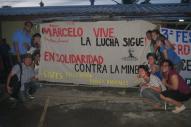
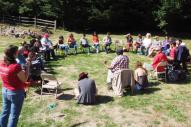
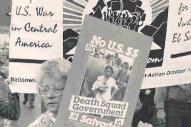

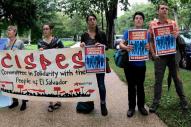


 "I am a CISPES supporter because continuing to fight for social justice and a more people-centered country means continuing the dream and sacrifice of thousands of my fellow Salvadorans who died for that vision.” - Padre Carlos, New York City
"I am a CISPES supporter because continuing to fight for social justice and a more people-centered country means continuing the dream and sacrifice of thousands of my fellow Salvadorans who died for that vision.” - Padre Carlos, New York City

